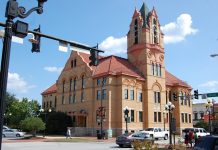By Stan Welch
In an election year with very little drama at the local and state levels, South Carolina nevertheless led the way in the Republican wave that swept from the east coast to the west, making history along the way.
Governor Nikki Haley’s historic re-election as the state’s first woman governor was announced within minutes of the closing of the polls, followed quickly by the announcement of Senator Tim Scott’s unprecedented election as the first black United States Senator in the historic South since the end of Reconstruction.
He was appointed by Governor Haley in 2012 to fill Jim DeMint’s term after DeMint resigned to assume leadership of the Heritage Foundation, a conservative think tank. Scott, South Carolina’s first black senator, faced Democrat Joyce Dickerson and American Party nominee Jill Bossi. He gathered sixty one per cent of the vote, to Dickerson’s thirty seven per cent.
Senior Senator Lindsey Graham was also quickly named as the winner of his Senate race, against several challengers, including Democrat Brad Hutto, Libertarian Victor Kocher, and Independent Thomas Ravenel. Graham won his third term in the Senate.
U.S. Congressman Jeff Duncan defeated Barbara Jo Mulliss for the District Three Congressional seat. Duncan’s percentage of the vote was in the seventy per cent range. Congressman Trey Gowdy, from Spartanburg, who has been in the national spotlight for his leadership of the investigation of the Benghazi incident, received a remarkable eighty six per cent of the vote in his race.
On the local level, the races were much less dramatic. In many cases, the Republican incumbents were unopposed. In the S.C. House races, Representatives Brian White, Mike Gambrell, Jonathon Hill, Anne Thayer and Josh Putnam were all unopposed.
Hill defeated incumbent Don Bowen in the Republican primary. District 11 incumbent Craig Gagnon, who represents mostly rural areas of Anderson and Abbeville counties, defeated Democrat Tombo Hite, an Abbeville attorney seeking his first elected office. Gagnon received fifty five per cent of the votes cast.
In other state races, Alan Wilson gained another term as state attorney general, with sixty per cent of the vote, while Mark Hammond won another term as Secretary of State by the same margin. Hugh Weathers won big as the incumbent agricultural commissioner, with eighty per cent of the vote, while Comptroller General Eckstrom won another term with sixty per cent of the vote.
Mollie Spearman won fifty seven per cent of the vote en route to her election as the State Superintendent of Education.
South Carolina voters approved an amendment that would make the post of adjutant general of the state National Guard an appointed position, rather than an elected one. They also approved a measure that will allow certain charitable organizations to run raffles as fund raisers without being regulated as a lottery by the state.
In the county council races, District One incumbent Frances Crowder handily defeated former Anderson County Democratic Party chairman Stuart Sprague. Crowder captured 4,466 votes, or sixty per cent, to Sprague’s 3,028 votes, or forty per cent.
Long time incumbent District Two Councilwoman Gracie Floyd defeated challenger Larry Ray Bright with approximately seventy per cent of the vote. Floyd and District Seven Councilwoman Cindy Wilson, who faced no opposition this time, are the longest sitting members of Council. Both came aboard in 2000.
The remainder of the Council seats were unopposed, with Republican Mitchell Cole taking over the District Three seat after defeating incumbent Eddie Moore in the primary. Council members Tom Allen, Tommy Dunn, Ken Waters, and Cindy Wilson all retained their seats by default.
Martha Newton easily won another term as probate judge.
Anderson County voters were the only ones out of three counties considering a one cent sales tax who approved it. By a fifty three to forty seven per cent margin, the voters approved the sales tax, whose proceeds will be used for various capital improvements, mainly the construction of a career center to be shared by school districts 3,4, and 5. Districts 1 & 2 already share the career center in Williamston.
The referendum also called for twenty per cent of the revenues generated to be used to reduce property taxes in the county. Greenville and Oconee counties soundly rejected sales tax proposals.
Following a busy summer during which he ran for and won an interim seat on the Greenville County Council following a primary and a runoff, District 26 representative Lynn Ballard is finally the County Council member from that part of Southern Greenville County that includes parts of Piedmont.














